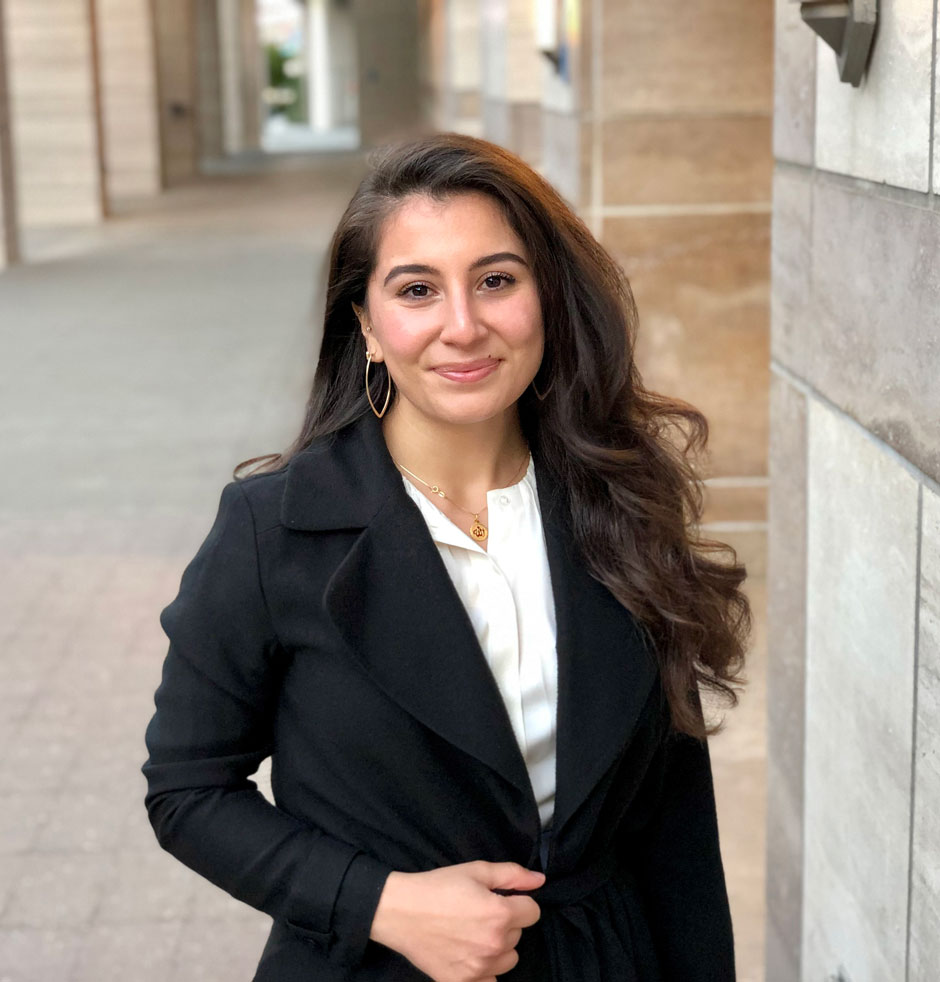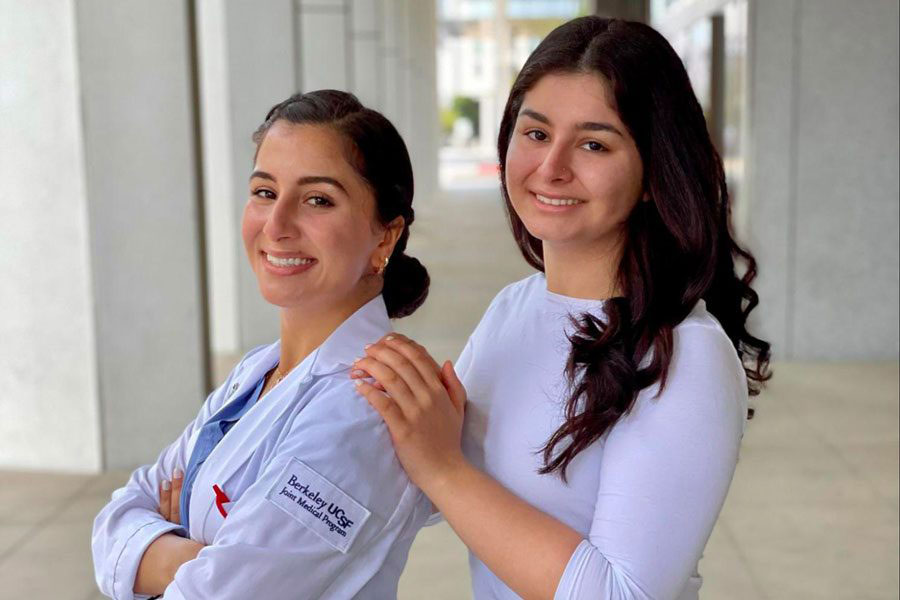A Cultural Homecoming
Nazineen Kandahari finds a balance between two worlds
By Kirsten Mickelwait

“It's not easy being an asylum-seeker,” says Nazineen Kandahari (BA 2017, MS 2020). “It’s pretty lonely, in fact.” She speaks from the experience of living in the Bay Area within a traditional, conservative Afghan family. For much of her life, she’s walked a fine line between those two cultures, trying to define herself as an independent young woman while remaining true to her Afghan roots — always in search of “home.” Now she’s leading a health initiative for Afghan refugees that enables her to excel as a medical professional while serving her ethnic community. And she’s anything but lonely.
With her younger sister, Nilufar Kayhani, who’s a UC Berkeley undergraduate in public health, Kandahari founded the Afghan Clinic while pursuing her MD/MS degree in the UC Berkeley-UCSF Joint Medical Program (JMP). The clinic is a community health initiative that addresses the specific needs of local Afghan refugees.
Kandahari received her BA from MCB with an emphasis in immunology and public health, doing undergraduate research in the lab of genetic biologist Andrew Dillin. Currently in her third year at UCSF, she’ll receive her MD in 2023 followed by a residency. Until then, she’s doing clinical rotations through specialties such as pediatrics, neurology, general surgery, obstetrics, anesthesia, and psychiatry. She expects to choose her specialty in the next few months.
Kandahari’s 12-hour shifts are combined with weekly Zoom didactics. She’s also a participant in the Program in Medical Education for the Urban Underserved (PRIME-US), a cohort of 15 students from underrepresented backgrounds who are being specially trained to serve those populations. “Growing up as an asylum-seeker in a refugee community was what first inspired me to pursue medicine,” she says.
Early on, she acted as an interpreter and advocate for her family’s health care, learning to anticipate questions and problems in advance. “One topic that was always taboo was sexual and reproductive health,” she remembers. In response, she’s done independent research in that area, and has found mentors in the OB-GYN field; it’s a specialty she’s considering for her own career.
As a medical student, Kandahari began working with the Highland Hospital Refugee Health program in Oakland to build her knowledge around cultural, linguistic, and medical practices in the clinical setting. But the clinic had another source of inspiration, too. “My mom would always take me to these gatherings called sofrehs,” she says. “It's a tradition where women get together to eat ceremonial foods, pray, socialize, and support one another. In a culture that has a deep history of undervaluing and oppressing women, it's a very sacred space — by women, for women.”
Two years ago, Kandahari was talking with her mother when the idea struck. “I was thinking, there are so many elements that are so beautiful within this sofreh tradition,” she says. “There's the social networking and support, there are the health benefits of spirituality. So often, research on marginalized populations is just focused on their deficits and all the things they don't have. I thought, as a public health professional, this would be beautiful to uplift strengths that already exist within the community.”
As a fluent Dari speaker, Kandahari felt she could deliver health-education messages during sofrehs that were tailored specifically to each group. She applied for two fellowships — UC Berkeley’s Human Rights Center fellowship and the Albert Schweitzer fellowship — and received both.

Then the COVID pandemic hit and the original plan of in-person meetings had to be postponed. Instead, Kandahari used her fellowship funding to conduct a qualitative study, interviewing a range of Afghan women about their needs around health and healthcare access. “I tapped into data that's never been explored before,” she says. “I wanted to inform both my own work, but also the discourse within the academic community.”
The Afghan Clinic is currently a free virtual resource for health-education materials that are sensitive to the language and cultural needs of Afghans. It conducts and disseminates research and seeks to create novel public health methods for this particular community of immigrants. To connect with them, Kandahari has conducted webinars, Zoom classes, and YouTube videos.
“We don't want to assume literacy when trying to create materials for this population,” she says. “In the Dari language, the word for Afghan is Afghan and clinic is clinic. So we can tell anyone to go to Afghanclinic.com and that's accessible.”
In some ways, COVID helped the clinic find its audience and voice, because the lockdown gave Kandahari the time to do a rigorous needs-assessment for the initiative. It enabled her to identify healthcare gaps and possible solutions. And it gave her a point of entry: misinformation about COVID vaccines.
The Afghan Clinic soon hosted a webinar that taught the basic principles of immunity. “This is largely a population that didn't even get to go to school, so how do vaccines work?” she says. As a result of the webinar, “not only were they ready to get vaccinated, but they were really excited about these vaccines.” Kandahari and Kayhani posted the webinar on YouTube, where it’s been watched by a worldwide audience. And once pandemic protocols can be further relaxed, they will resume their original idea of in-person gatherings.
Another formative factor in her own medical journey was her undergraduate experience at MCB. Attending lectures by luminaries like Jennifer Doudna, a recent Nobel laureate, and working in a lab under the direction of professor Andrew Dillin and postdoc Ashley Frakes made her passionate about research. Dr. Dillin’s focus on aging and deterioration sparked another passion.
“They trained me to do bench science and taught me research from the ground up,” she says. “They invested in my potential because they saw my intense curiosity and desire to learn. Research changed from this daunting, unknown thing to being a place of comfort.” The Biology Scholars Program, led by Dr. John Matsui, was another valuable undergraduate experience.
With plenty of work still awaiting her on the path to her MD, and with massive potential for the impact of the Afghan Clinic, one thing is certain: Kandahari won’t be getting much sleep anytime soon. But the rewards are already abundant.
“Afghan Clinic is my coming home, uniting my Afghan world with my American world, and creating the changes I’ve always wanted to see,” she says. “The consistent thread in my life has been about discovering my own agency and promoting agency for other people. That's been my goal with the Afghan Clinic, and will be with whatever medical specialty I choose. It's really how I want to live every day.”
To learn more about the Afghan Clinic, read Sisters and UC Berkeley students create health education initiative for Afghan refugees or visit https://www.afghanclinic.com.
Back to Main Fall 2021 Newsletter Page
| Connect With Us! | ||||
MCB Twitter |
 MCB Facebook |
 LinkedIn Postdocs, PhDs, or Undergrads |
 Cal Alumni Network |
 Give to MCB |

